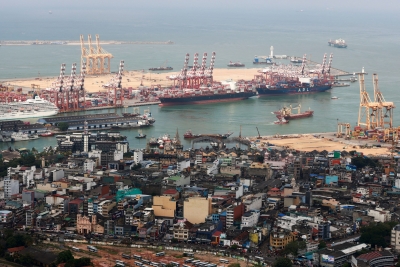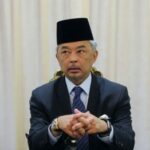MARCH 25 — In international business and diplomacy, silence is often mistaken for pragmatism. Non-intervention becomes economic calculus. War crimes are euphemised as “domestic challenges.” But when entire communities are systematically erased — not just from territory, but from memory — silence becomes complicity.
This month, the United Kingdom imposed sanctions on four Sri Lankan figures responsible for gross human rights violations during the island’s civil war, including extrajudicial killings, torture, and sexual violence. Among them: Shavendra Silva, Wasantha Karannagoda, Jagath Jayasuriya — all former heads of Sri Lanka’s military apparatus — and Vinayagamoorthy Muralitharan (a.k.a. Karuna Amman), the paramilitary defector once hailed as a “peace partner” but long implicated in atrocities.
These sanctions mark a long-overdue, if largely symbolic, recognition of what transpired in Sri Lanka in 2009: a calculated, state-sanctioned massacre of Tamil civilians in the name of national unity.
The global community, including its business class, must now confront a hard truth: the cost of post-war peace in Sri Lanka was not reconciliation. It was silence, militarisation, and the monetisation of trauma.
From independence to identity politics
The seeds of the conflict were not sown in 2009, nor even in 1983’s infamous “Black July” pogroms. They were laid much earlier — in 1948, when Sri Lanka (then Ceylon) gained independence. The newly minted Sinhalese-majority government moved swiftly to disenfranchise Indian-origin Tamils, stripping nearly 700,000 plantation workers of citizenship in a single legislative stroke. This was followed in 1956 by the Sinhala Only Act, institutionalising linguistic apartheid.
Public service access, university admissions, and national identity were soon weaponised against Tamil citizens. Entire communities were pushed to the periphery — politically, economically, and culturally — creating a blueprint for structural violence that would later become militarised.
Genocide as a military strategy
In 2009, the Sri Lankan government declared victory over the Liberation Tigers of Tamil Eelam (LTTE). What the world failed to see — or chose to ignore — was that victory was achieved through indiscriminate bombing of hospitals, schools, and designated “No Fire Zones.” Satellite imagery, forensic analysis, and eyewitness testimony confirm that the military shelled civilian areas despite receiving GPS coordinates from doctors and humanitarian agencies.
An estimated 40,000 Tamil civilians were killed in the final five months of the war — though some sources suggest far higher numbers. Entire families were incinerated. Others were buried in mass graves. Journalists were expelled. International observers were denied access.
Post-war, the state rebranded this as a “Humanitarian Operation.” In reality, it was ethnic cleansing under the banner of counterterrorism.
Peace by occupation, growth by militarisation
Post-conflict Sri Lanka embraced a model of “stability through surveillance.” Rather than dismantling the wartime military infrastructure, the government entrenched it — particularly across Tamil-majority regions in the North and East. By 2011, Sri Lanka had one of the highest soldier-to-civilian ratios in the world.
Today, military-run businesses dominate local economies in the north. Army-owned hotels, farms, and construction firms compete directly with civilian enterprises. Displaced Tamil families, meanwhile, remain landless, awaiting restitution that never comes. This is not post-war development. This is extractive peacetime capitalism, with the state as both landlord and victor.
Foreign investors, too, flocked to Colombo in the post-war boom, betting on “stability.” Infrastructure projects mushroomed. GDP rose. But growth figures masked deeper fractures — trauma that was never treated, justice that was never delivered, and war crimes that remained unacknowledged.
The International Monetary Fund extended credit. The Asian Development Bank poured in capital. China, India, and the West competed for strategic influence. None asked the hard questions about war crimes, reparations, or transitional justice. Sri Lanka was now “open for business.”
But at what cost?
Accountability is not optional
The sanctions imposed by the UK — and previously by the US and Canada — are a first crack in the architecture of global impunity. They signal a growing consensus that economic cooperation cannot be divorced from ethical governance. Nations cannot build their futures on the mass graves of their minorities and expect the world to look the other way forever.
This is particularly relevant for Southeast Asia, where multi-ethnic societies and post-colonial borders continue to test the limits of nationhood. If we do not speak up when genocide is disguised as internal security, we legitimise a dangerous precedent: that “peace” can be engineered through silence, surveillance, and systemic injustice.
The global financial system has long favoured political stability over moral accountability. But investors, policymakers, and international institutions must recognise that there is no real stability without justice. There is no economic recovery when an entire community is forced to grieve in silence, their land occupied, their history erased.
What comes next?
For Tamils, justice is not a slogan — it is an existential demand. The mothers of the disappeared continue to protest, over 3,000 days and counting. They do not seek vengeance. They seek truth. They seek answers. They seek the right to mourn — and the right to be seen.
For the international community — including Malaysia — this is a litmus test. Will we continue to trade with regimes that bury accountability beneath GDP charts? Or will we recalibrate our economic diplomacy to align with the moral arc of justice?
Sri Lanka’s war is not over. It merely changed form. It is now waged in the courts of memory, the markets of post-war reconstruction, and the silence of international institutions.
And in that silence, a question echoes:
What is the true cost of looking away?
* This is the personal opinion of the writer or publication and does not necessarily represent the views of Malay Mail.







